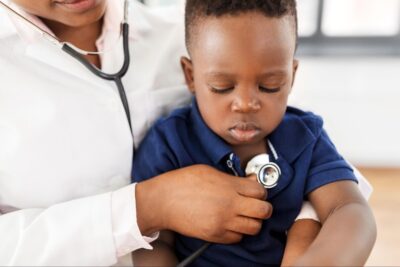Pneumonia is a respiratory infection that can affect people of all ages but is particularly concerning in children due to their developing immune systems. Knowing the signs, causes, and treatment options for pediatric pneumonia can help parents and caregivers respond effectively if their child becomes ill. At Wake Forest Pediatrics, we prioritize your child’s respiratory health and are here to support you with compassionate care and guidance.
What is Pneumonia?
Pneumonia is an infection that inflames the air sacs (alveoli) in one or both lungs, causing them to fill with fluid or pus. This makes breathing difficult and can lead to coughing, fever, and chest pain. Pneumonia in children can vary from mild to severe, and early treatment is crucial to prevent complications.
Causes of Pneumonia in Children
Pneumonia can be caused by different types of microorganisms, including:
- Viruses – Viruses like the flu, RSV (Respiratory Syncytial Virus), and the common cold are frequent causes, especially in young children.
- Bacteria – Bacterial pneumonia, often caused by Streptococcus pneumoniae, can result in more severe symptoms and may follow a viral infection.
- Fungi and Other Agents – In rare cases, children with weakened immune systems may develop fungal pneumonia, which generally requires specialized treatment.
Common Symptoms of Pneumonia in Children
Pneumonia symptoms in children can be similar to those of a common cold but tend to escalate more significantly. Key symptoms include:
- Persistent coughing
- High fever, often above 102°F (39°C)
- Rapid or labored breathing
- Wheezing or rattling sounds in the chest
- Chest pain or discomfort
- Loss of appetite and low energy
- In severe cases, children may experience blueish lips or fingertips, a sign of oxygen deficiency.
Tip: Since children may not always articulate their symptoms well, keep a close watch for changes in their breathing or behavior.
How is Pneumonia Diagnosed?
At Wake Forest Pediatrics, our pediatricians use several methods to diagnose pneumonia:
- Physical Examination – Listening to your child’s lungs for crackling or wheezing sounds and observing their breathing.
- Chest X-ray – An X-ray can confirm pneumonia and determine the extent of the infection.
- Blood Tests and Mucus Sample – These may help identify whether a virus or bacteria is causing the infection, which guides treatment.
Treatment Options for Pneumonia in Children
The treatment plan for pneumonia depends on whether it is viral, bacterial, or caused by another agent:
- Viral Pneumonia – Viral infections typically do not require antibiotics. Treatment focuses on supportive care, such as rest, fluids, and fever management.
- Bacterial Pneumonia – Antibiotics are essential for bacterial pneumonia, and the pediatrician will prescribe a child-safe antibiotic based on your child’s needs.
- Hospitalization – In severe cases, especially if a child has trouble breathing or needs oxygen, hospitalization may be necessary to provide round-the-clock care.
Home Care Tips: Make sure your child gets plenty of fluids to stay hydrated, and use a cool-mist humidifier to help soothe their airways.
Preventing Pneumonia in Children
Here are some effective prevention tips to protect your child:
- Vaccination – Immunizations like the flu shot, pneumococcal vaccine, and Hib vaccine significantly reduce the risk of certain types of pneumonia.
- Handwashing – Teaching children to wash their hands frequently can prevent the spread of germs.
- Avoiding Exposure – Limit exposure to cigarette smoke and crowded places during peak cold and flu seasons, as smoke can irritate the lungs and make them more susceptible to infection.
When to See a Doctor
Call a healthcare provider if your child:
- Has a high fever that doesn’t respond to medication
- Shows signs of difficulty breathing, like rapid breathing, grunting, or wheezing
- Becomes excessively tired or unresponsive
- Exhibits signs of dehydration (such as a dry mouth, fewer wet diapers, or dark urine)
Pneumonia in children can be a concerning diagnosis, but with timely treatment and supportive care, most children recover fully. At Wake Forest Pediatrics, our team is here to answer any questions you have and provide expert care if your child becomes ill. If you notice any of the symptoms mentioned or are concerned about your child’s breathing, don’t hesitate to contact us for an appointment. Together, we can help keep your child healthy and thriving.




